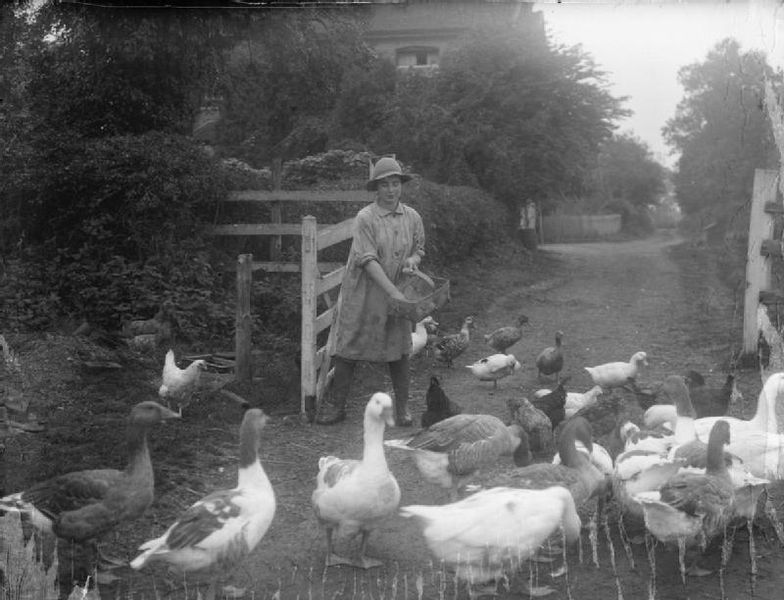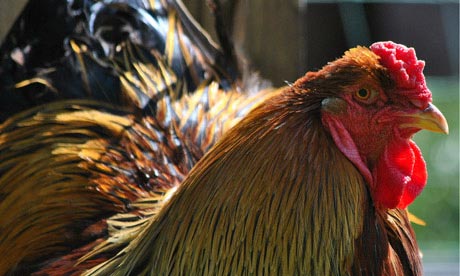 |
| via Wikimedia Commons |
Another week vanished, another Friday, and another mass of stories and comments that all fit into an overall narrative about the food system--a narrative I'm having a hard time detailing, but one that is clearly scary.
 |
Samuel Palmer - At Hailsham, Sussex- a Storm Approaching |
 |
| via Wikimedia Commons |
The chemical companies that dominate the billion-dollar neonicotinoid market, Bayer and Syngenta, were relieved. Syngenta chief operating officer, John Atkin, said: "We are pleased member states did not support the EC's shamefully political proposal. Restricting the use of this vital crop protection technology will do nothing to help improve bee health."
A spokeswoman for the Department for Environment, Food and Rural Affairs defended the UK's abstention: "Bee health is extremely important but decisions must be based on sound scientific evidence and rushing this through could have serious unintended consequences both for bees and for food production. We are not opposing the EU's proposals. But as we do not have the evidence yet it is impossible for us to vote either way."
But Prof Dave Goulson, at the University of Stirling and who led one of the key studies showing that neonicotinoids harm bumblebees, told the Guardian: "The independent experts at EFSA spent six months studying all the evidence before concluding there was an unacceptable risk to bees. EFSA and almost everybody else – apart from the manufacturers – agree this class of pesticides were not adequately evaluated in the first place. Yet politicians choose to ignore all of this."Yet all is not quite lost. Aljazeera is reporting:
At the end of another year of painful austerity and mouting debts, Greece's battered economy is seeing over 1,000 workers lose their jobs every day.
On the surface, many cities still looks prosperous, but the nation's deep crisis is clearly reflected in the windows of hundreds of empty shops.
More than one million Greeks are unemployed, which is one-quarter of the workforce, and the country is facing a youth unemployment rate of 58 percent.
But while many are struggling to survive in this harsh financial climate, others are returning to the land from the towns and cities that onced promised so much.
Up until a month ago, Kostas Bozas was a city banker. Now he is unemployed and has moved to his father's house in a village outside Thessaloniki, going back to his roots in search of a future.
"I come a from a steady job, and now at the age of 50 it's the right opportunity to become a farmer ... my father will teach me the things he knows from his father."
Thousands have taken the road back to farming in recent years - while the rest of the economy is in free fall, the farming sector is actually adding jobs.
Foodtank chose Kara Newman's book, The Secret Financial Life of Food as their book of the week. From the review:
The Secret Financial Life of Food uncovers the economic pathways that connect food to consumer, revealing the mysteries behind culinary trends, grocery pricing, and restaurant dining. Newman travels back to the markets of ancient Rome and medieval Europe, where vendors first distinguished between "spot sales" and "sales for delivery." Newman centers her history on the transformation of corn into a ubiquitous commodity and uses oats, wheat, and rye to recast America's westward expansion and the Industrial Revolution. She discusses the effects of such mega-corporations as Starbucks and McDonalds on futures markets and considers burgeoning markets, particularly "super soybeans," which could scramble the landscape of food finance. The ingredients of American power and culture, and the making of the modern world, can be found in the history of food commodities exchange, and Newman connects this unconventional story to the how and why of what we eat.Great. Just what I need--another food book to read....
There's an interview with Peter Rosset over at HuffPo:
Yet a third pillar in reclaiming control of agriculture means changing how we produce food. La Via Campesina and other social movements say that we can no longer afford to keep food prices tied to the cost of petroleum. We can't keep using indiscriminate amounts of chemical fertilizer, tractors, mechanical harvesters and pesticides. We need to engage in ecological agriculture that preserves soil fertility for future generations.Interesting how any critique of the food system always comes back to the dominance of a half-dozen multinational companies...
Fourthly, we need to defend the territories of indigenous peoples and peasant communities who haven't yet lost their land. Part of the strategy must also be to gain new territories through land reform or land occupations.
A fifth element involves seeds. We can't allow seeds to be patented and privatized by Monsanto and Syngenta and other corporations. We can't allow them to be contaminated by GMOs. We need to support the free exchange of local, indigenous seeds, because those varieties are much more adapted to local environmental conditions and can form a much stronger basis for new national food systems.
Sixth, we need to nationalize the food reserves that are in the hands of transnational
corporations.
Part of the origin of the recent food crisis is that under neoliberal policies of the past 20 years, most countries sold off their food inventories that were in the hands of the public sector.
Back at the Guardian, Julian Baggini talks about the need to preserve artisanal foodstuffs for a lot of different reasons.
It's certainly not difficult to work out why einkorn wheat vanished from British tables long ago. Even Michael Marriage of Doves Farm, who recently started growing the crop with his wife Clare, tells me: "You get a pretty pathetic yield, the heads are tiny, and you get pretty small grain." Plus, each tiny einkorn seed is encased in a hard shell and needs de-hulling.I was looking at some photos from the turn of the last century at the University of Victoria this week, and they showed people standing next to their grain crops. Not only were they getting pretty good yields, but the straw was about two metres high before you got to the grains. This has been bred out of modern varieties in order to put that energy into developing better yields and earlier ripening times. But the value of that straw has been lost. Thatched roofs, for example, cannot be done without long straw. Asphalt shingles may be better, but are not quite as sustainable. But these are some of the choices we've made with the food and agriculture systems. I'm not claiming that things are worse, just that maybe we should reserve the right to unmake some of our decisions....
However, wait until you taste it. My breadmaking skills are strictly elementary, but even the quick, simple recipe on the side of the flour packet resulted in a very tasty loaf with an almost cake-like, soft, close-crumb texture and hints of corn and nuts.
 |
| Photograph: Andy Cawthray |
It may seem hard for the non-chicken keeper to understand, but commercial poultry farmers and pet chicken owners will begin to hear and understand their chickens' different vocalisations and also how they react favourably to a human voice.I've had less experience with the heritage breeds he raises, but would have to agree on the general intelligence he writes about. And I know my sister-in-law would certainly agree. Her highly-indulged chickens are pets that happen to leave eggs lying about, and have a chicken condo that many people would envy.
On a more one-to-one level, I've known hens seek me out once they have laid an egg, as if to tell me it's ready for collection. I even had a cockerel who made an excellent mouser, regularly raiding the polytunnel for mice, but not disturbing or eating the greens, of which the offcuts or surplus would eventually become a food source for him.

No comments:
Post a Comment